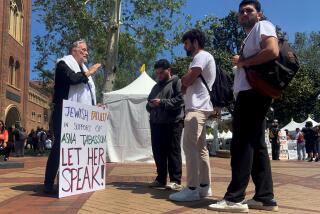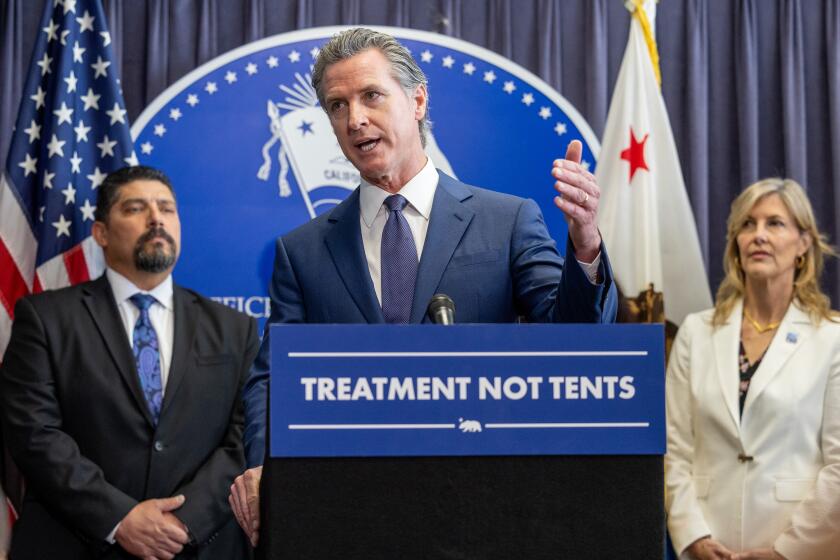Doctor charged in death of donor
A San Francisco transplant surgeon was criminally charged Monday with excessively prescribing drugs to a 25-year-old disabled man last year in order to hasten his death and harvest his organs sooner.
The felony charges are believed to be the first in the nation against a physician for his role in a transplant.
Experts said the case is likely to raise uneasiness among potential organ donors and could prompt doctors to shy away from a somewhat controversial practice of retrieving organs before a patient is brain dead.
The San Luis Obispo County district attorney’s office accused Dr. Hootan Roozrokh, 33, of dependent adult abuse, administering a harmful substance and prescribing controlled substances without a legitimate medical purpose.
The surgeon allegedly ordered massive amounts of narcotic painkillers and sedatives for Ruben Navarro, a physically and mentally disabled man, on Feb. 3, 2006. In addition, Roozrokh is accused of administering the antiseptic Betadine through a feeding tube into Navarro’s stomach, a sterilization procedure typically done after a donor is dead.
“The law and the facts indicated that Dr. Roozrokh ... tried to accelerate [Navarro’s] death to facilitate the harvesting of his organs,” said Chief Deputy Dist. Atty. Stephen Brown.
Navarro survived for more than seven hours after he was removed from life support and given the drugs. By that time, his organs were no longer viable and could not be recovered.
Roozrokh’s lawyer, M. Gerald Schwartzbach, called his client an “extremely dedicated and accomplished organ transplant surgeon” and said the charges filed against him were “unfounded and ill-advised.”
“Dr. Roozrokh did not commit any crime,” Schwartzbach said in a written statement.
If convicted of the three counts, Roozrokh could receive up to eight years in state prison and a $20,000 fine, the district attorney’s office said. A warrant has been issued for Roozrokh’s arrest, and he is expected to turn himself in this week. He will be required to post a $10,000 bond.
Roozrokh was a surgeon with Kaiser Permanente’s now-defunct kidney transplant program in San Francisco when he and a Kaiser colleague went to Sierra Vista Regional Medical Center in San Luis Obispo to retrieve Navarro’s organs. However, the two surgeons were not working on behalf of Kaiser when they went to Sierra Vista but for the group that procures and distributes organs in much of Northern and Central California.
Navarro had been on life support after being found unresponsive Jan. 29, 2006, at a nearby long-term care facility. His family agreed to donate his organs.
Late in the evening of Feb. 3, he was taken to the operating room and removed from life support. As at least six people stood by, including Navarro’s treating physician, Roozrokh ordered a total of 200 milligrams of the narcotic morphine and 80 milligrams of the sedative Ativan for him, according to a report by federal inspectors. Those were many times the normal doses of the drugs, experts have told The Times.
After Navarro had been off life support for about 30 minutes -- the time limit set to ensure the viability of organs -- the process was ended. Navarro was returned to the intensive care unit, where he died early the next morning, five days before his 26th birthday. (Authorities and The Times have sometimes said incorrectly that Navarro was 26 at the time of his death.)
The case came under scrutiny by medical and law enforcement authorities after the operating room staff expressed concerns about the actions of the doctor and of the nurse who was administering the drugs. Under state law, transplant doctors cannot direct the care of organ donors before they are declared dead.
The San Luis Obispo County coroner’s office ruled this March that Navarro died of natural causes. But “the central issue of the case was the mistreatment of a severely disabled adult,” said Brown of the district attorney’s office.
Brown said it would have been difficult to pursue a more serious charge of murder or attempted murder because Navarro survived for hours after being given the drugs. No one besides Roozrokh has been criminally charged.
Schwartzbach said Monday that Roozrokh is blameless.
“Nothing that Dr. Roozrokh did or said at the hospital that night adversely affected the quality of Mr. Navarro’s life or contributed to Mr. Navarro’s eventual death,” he said.
Roozrokh was placed on administrative leave by Kaiser in May 2006 after HMO officials became aware of the allegations against him. He was reinstated in January but the next month voluntarily agreed not to see patients, Kaiser spokesman Matthew Schiffgens said. With the filing of criminal charges Monday, the surgeon once again has been placed on leave.
“The case did not involve a Kaiser Permanente patient, or a Kaiser Permanente hospital,” Schiffgens said in a written statement, adding that Kaiser was cooperating fully with the investigation.
Similarly, Sierra Vista officials said in a statement that Roozrokh was not a member of its staff and that the hospital continues to cooperate with authorities.
Although prosecution of doctors for medical performance is rare and generally opposed by physician groups, some ethicists and doctors said Monday that strong action was warranted in this case.
If his intention was “to kill the person, have the person die sooner, but the person didn’t actually die, that’s attempted murder,” said Michael Shapiro, an ethicist and law professor at USC.
But some transplant professionals worried that the charges might prompt surgeons to be overly cautious in how and when they recover organs -- especially in the type of organ retrieval attempted in Navarro’s case, known as “donation after cardiac death.”
Surgeons “will pull back. They will be more careful,” said Dr. Goran Klintmalm, head of the Baylor Regional Transplant Institute in Dallas and president of the American Society of Transplant Surgeons. “They will turn situations down because they don’t want to have any exposure.”
Donation after cardiac death involves patients who have suffered a devastating brain injury and require ventilators to breathe but who still have minimal brain function.
In such cases, patients are removed from life support with their families’ consent. Generally, their hearts stop within minutes and they are declared dead. Their organs are then harvested.
Such procedures have become more common in recent years as doctors have sought to expand the donor pool. But some hospitals question the ethics of removing life support from a patient for the purpose of retrieving organs.
As of Monday, nearly 97,000 people were on the national waiting list for organs.
Some transplant experts and medical ethicists said the charges against Roozrokh tap into a primal fear about transplants and concerns that organs might be taken too soon.
“You get one case like this and people get worried,” said Dr. Michael Grodin, director of medical ethics at Boston University’s School of Public Health.
“This could be a major, major setback for actually appropriate donation. This is an example of something that could be really, really scary for the public at large.”
Navarro’s mother said that her son, 80 pounds and cognitively impaired, was exploited.
“They mistreated him and they abused him and they took advantage of him and me,” said Rosa Navarro, who is suing Roozrokh, the regional transplant procurement group, Sierra Vista and others.
“He didn’t die with dignity, and I didn’t have the chance to really say goodbye to him. I don’t think it’s right. These people need to pay for what they did to him.”
tracy.weber@latimes.com
More to Read
Start your day right
Sign up for Essential California for news, features and recommendations from the L.A. Times and beyond in your inbox six days a week.
You may occasionally receive promotional content from the Los Angeles Times.






